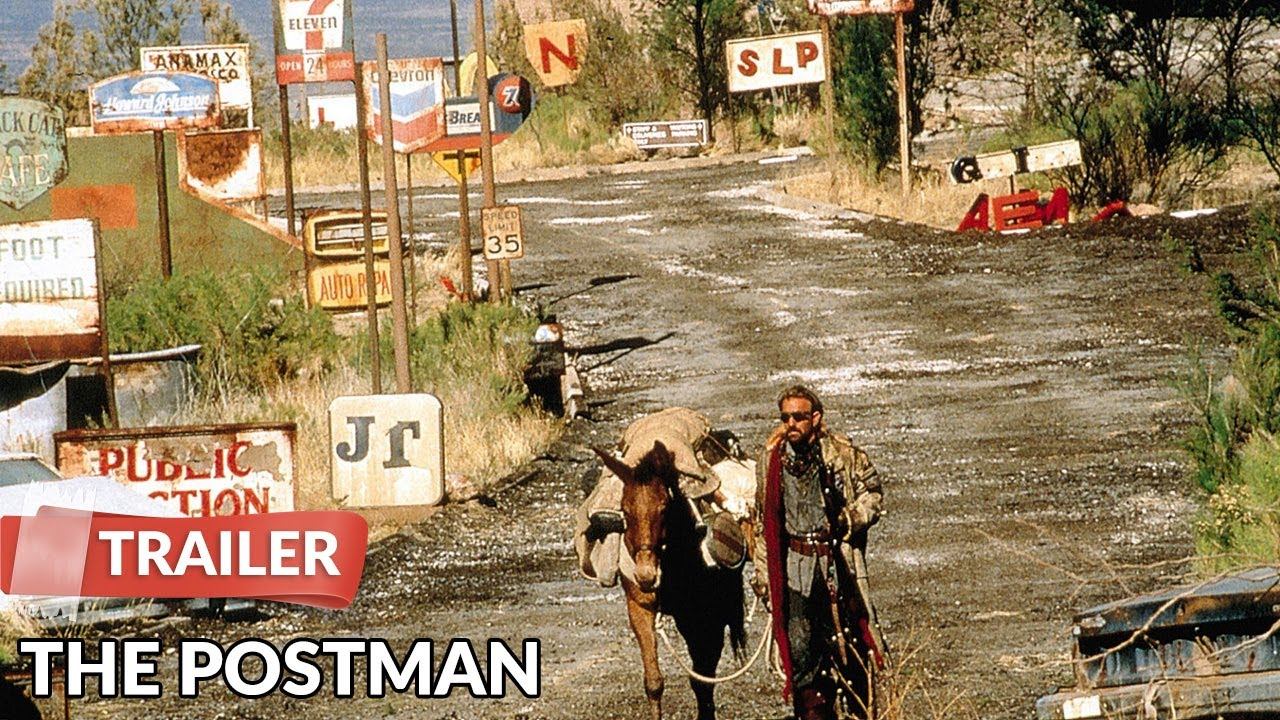The Postman (1997)

The Postman, released in 1997, is a post-apocalyptic adventure film directed by and starring Kevin Costner. The film, which also features Costner as the producer, is based on the 1985 novel of the same name by David Brin. With a screenplay adapted by Eric Roth and Brian Helgeland, The Postman explores themes of hope, redemption, and the power of communication in a dystopian future ravaged by societal collapse.
Set in a desolate America following a devastating global war, the film paints a grim picture of a world where civilization has crumbled and lawlessness prevails. The story follows the character of a nameless drifter, played by Kevin Costner, who stumbles upon a post-apocalyptic society struggling to maintain its identity and hope for the future. The film opens with the protagonist scavenging for food and supplies, embodying the bleak reality of life in a world without order.
The central plot of The Postman revolves around the drifter’s transformation into a symbol of hope and renewal. After discovering a uniform and a bag of letters from a long-extinct postal service, he assumes the role of a postman, delivering messages and rekindling a sense of community and purpose among the survivors. This act of delivering letters becomes a powerful metaphor for re-establishing connections and rebuilding trust in a fractured world.
Kevin Costner’s dual role as the film’s lead actor and director is pivotal to its execution. His portrayal of the drifter, who becomes known as “The Postman,” is marked by a blend of stoicism and vulnerability. Costner’s performance captures the character’s evolution from a self-serving wanderer to a symbol of hope and resilience. As a director, Costner crafts a visually stunning and emotionally resonant narrative, emphasizing the stark contrasts between the desolate landscape and the burgeoning hope represented by the protagonist’s efforts.
The film’s visual style contributes significantly to its storytelling. The cinematography, led by John Lindley, captures the barren and unforgiving environment of the post-apocalyptic world, using sweeping landscapes and desolate settings to create a sense of isolation and despair. This visual portrayal serves as a backdrop for the film’s central themes of renewal and human connection, highlighting the contrast between the bleak present and the potential for a better future.

The screenplay by Eric Roth and Brian Helgeland is instrumental in conveying the film’s themes and emotional depth. The dialogue and narrative structure explore the concept of hope as a driving force in the face of adversity. The letters delivered by the protagonist not only symbolize the revival of communication but also represent the restoration of lost ideals and the rekindling of faith in humanity.

One of the film’s notable strengths is its portrayal of the antagonist, General Bethlehem, played by Will Patton. Bethlehem is the leader of a militant group that seeks to impose a new order through fear and domination. Patton’s performance as Bethlehem adds a layer of complexity to the film, highlighting the struggle between authoritarian control and the yearning for freedom and unity. Bethlehem’s character embodies the oppressive forces that the protagonist must confront and overcome in his quest to bring hope to the people.

The supporting cast, including Joan Allen as Abby, a strong-willed and compassionate woman who becomes an ally and love interest for the protagonist, adds depth to the film’s exploration of human relationships and the rebuilding of society. Allen’s performance complements Costner’s portrayal, providing a counterbalance of strength and emotional depth.
Despite its many strengths, The Postman received mixed reviews from critics upon its release. Some praised its ambitious scope and thematic depth, while others critiqued its pacing and narrative execution. The film’s lengthy runtime and occasional lapses in pacing were points of contention, but its visual and emotional impact remained significant for many viewers.

In conclusion, The Postman is a compelling and visually impressive post-apocalyptic epic that explores themes of hope, redemption, and the power of communication. Directed by and starring Kevin Costner, the film offers a poignant narrative set against a bleak and desolate landscape. Through its portrayal of a world in ruins and the protagonist’s quest to rekindle hope, the film delivers a powerful message about the resilience of the human spirit and the importance of connection in times of despair. While it may have faced some criticism, its thematic richness and emotional depth ensure its place as a notable entry in the genre of post-apocalyptic cinema.











